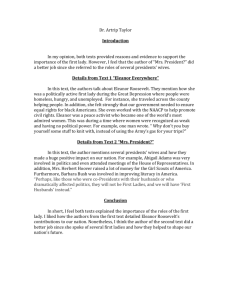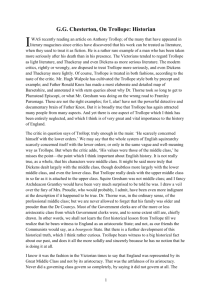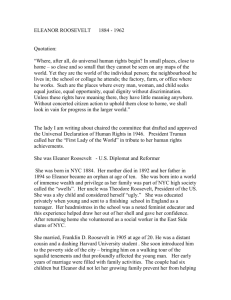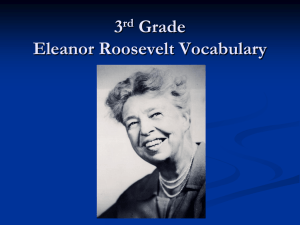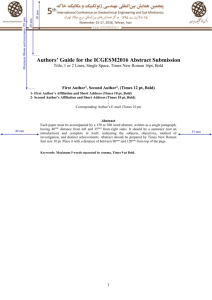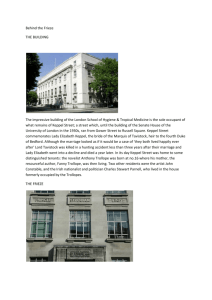Mueller's First Prize Essay 2005 ()
advertisement
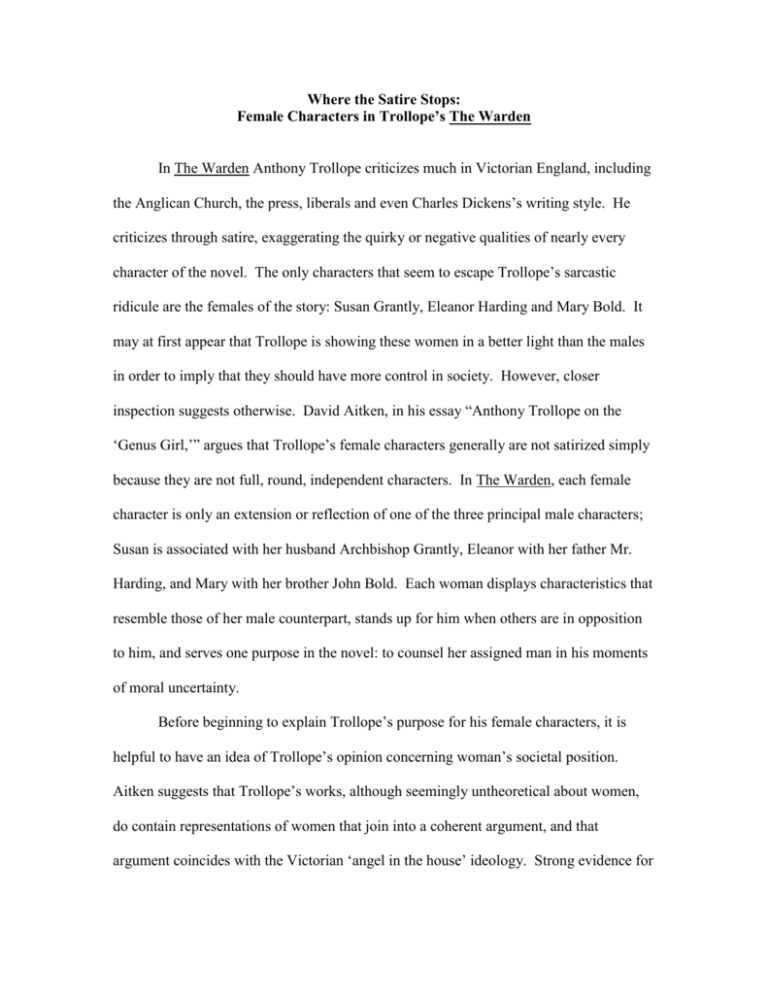
Where the Satire Stops: Female Characters in Trollope’s The Warden In The Warden Anthony Trollope criticizes much in Victorian England, including the Anglican Church, the press, liberals and even Charles Dickens’s writing style. He criticizes through satire, exaggerating the quirky or negative qualities of nearly every character of the novel. The only characters that seem to escape Trollope’s sarcastic ridicule are the females of the story: Susan Grantly, Eleanor Harding and Mary Bold. It may at first appear that Trollope is showing these women in a better light than the males in order to imply that they should have more control in society. However, closer inspection suggests otherwise. David Aitken, in his essay “Anthony Trollope on the ‘Genus Girl,’” argues that Trollope’s female characters generally are not satirized simply because they are not full, round, independent characters. In The Warden, each female character is only an extension or reflection of one of the three principal male characters; Susan is associated with her husband Archbishop Grantly, Eleanor with her father Mr. Harding, and Mary with her brother John Bold. Each woman displays characteristics that resemble those of her male counterpart, stands up for him when others are in opposition to him, and serves one purpose in the novel: to counsel her assigned man in his moments of moral uncertainty. Before beginning to explain Trollope’s purpose for his female characters, it is helpful to have an idea of Trollope’s opinion concerning woman’s societal position. Aitken suggests that Trollope’s works, although seemingly untheoretical about women, do contain representations of women that join into a coherent argument, and that argument coincides with the Victorian ‘angel in the house’ ideology. Strong evidence for his argument is a passage from a letter written by Trollope: “You cannot, by Act of Congress or Parliament make the woman’s arm as strong as the man’s or deprive her of her position as the bearer of children. We may trouble ourselves much by debating a question which superior power has settled for us, but we cannot alter the law…The necessity of the supremacy of man is as certain to me as the eternity of the soul” (qtd. in Aitken 419). Clearly Trollope believed it to be God’s will that woman remain in the house as the bearer of children rather than have an outside life of her own that is not centered around her marriage and family. Such evidence makes it seem quite logical that the female characters in The Warden only exist as attachments to a male figure. After all, if Trollope believed that a woman’s life should be centered on a male, then naturally his typical female character would not exist beyond the central male in her life. In contrast with his flat female characters, Trollope attempts to show multiple sides of each male’s personality. For example, though Grantly is the character closest to being the villain of the tale, Trollope takes time at the end of the novel to give him credit for his virtues: “We fear that he is represented in these pages as being worse than he is; but we have had to do with his foibles, and not with his virtues. We have seen only the weak side of the man, and have lacked the opportunity of bringing him forward on his strong ground” (174). He follows with an extensive list of Grantly’s positive characteristics, and finally repeats his fear that Grantly was not represented fully: “It is a matter of regret to us that the course of our narrative has required that we should see more of his weakness than his strength” (174). Mr. Harding, in contrast, is the most sympathetic character. Nevertheless, Trollope does not fail to present his flaws: he is annoyingly naïve, he fails to recognize the unfairness of his wage before Bold points it 2 out to him and, until the end, he lets his son-in-law run his life. Finally, John Bold is a pushy and overly idealistic man, but he swallows his pride and gives up his mission for Eleanor’s love. Trollope creates Grantly, Harding and Bold to resemble real people who have both character strengths and flaws, and who learn and change through experiences. Many of those experiences that cause the roundedness and development in the male characters take place outside of the domestic sphere. The female characters of The Warden are not involved in the world of the church and politics that the men are involved in. They do not take interest in the happenings of the church until it affects their sphere of home and family. They truly represent the “angel in the house” whose only connection to the outside world is the central man in her life. The first and most obvious way that Trollope associates each female character with a more fully developed male character is with living arrangements; Susan lives with Mr. Grantly, Eleanor lives with Mr. Harding and Mary lives with Mr. Bold. A second way is by giving them characteristics that resemble their male counterparts. Susan, Trollope notes late in the novel, “had at one time ruled supreme in her father’s house…” (165) She clearly holds a domineering position over the warden, just as Archbishop Grantly does. She also shares qualities of practicality and prudence with her husband, as are seen in her private discussions with him concerning Bold’s relationship with Eleanor. In the first chapter she is trying to convince Grantly to stay out of Bold’s affairs and let him marry Eleanor as he pleases: “I don’t agree with you. Not that I like Mr Bold – he is a great deal too conceited for me; but then Eleanor does, and it would be the best thing in the world for papa if they were to marry. Bold would never trouble himself about Hiram’s Hospital if he were papa’s son-in-law” (13). Later, after Grantly has already 3 meddled in the situation, his wife scolds him: “And all because you didn’t like John Bold for a brother-in-law. How is she ever to do better? Papa hasn’t got a shilling; and though Eleanor is well enough, she has not at all a taking style of beauty. I’m sure I don’t know how she’s to do better than marry John Bold, or as well indeed” (63). Like Grantly, Susan is not concerned with the love that Eleanor and Bold feel for one another, but only with the practical results that will come about through their union. The key difference between Susan and Grantly, though, is that Susan’s practical concerns do not extend into the activities of the church, for that is outside of her familial and social sphere. Eleanor, on the other hand, is an extreme contrast to her sister, in the same way that Mr. Harding is a contrast to Mr. Grantly. Eleanor is innocent, emotional, easily manipulated and naïve about the reality of the world. For example, in the “Iphigenia” chapter, Trollope, conversing with his audience about the upcoming events in the story, explains that Eleanor had no idea that going to Bold’s house and pleading to him would end with her being engaged to him. He says, “She may get kissed; I think it very probable that she will; but I give my solemn word and positive assurance, that the remotest idea of such a catastrophe never occurred to her, as she made the great resolve now alluded to” (91). This is the same kind of naiveté that Mr. Harding displays throughout the novel, especially in the fact that he had never before considered on his own that anyone may find his unfairly large salary problematic. A second key similarity between Mr. Harding and his daughter is that they are both emotionally torn. Harding is torn about whether or not he should give up his warden salary because he does not want to injure either his colleagues or the twelve bedesmen. Eleanor is torn between loyalty to her father and love for Bold. Her inner dilemma is 4 evident in the “Iphigenia” chapter, as Eleanor gazes into a mirror composing herself before confronting Bold in his sitting room: Eleanor was certainly thinking more of her father than herself, as she arranged her hair before the glass, and removed the traces of sorrow from her face, and yet I should be untrue if I said that she was not anxious to appear well before her lover: why else was she so sedulous with that stubborn curl that would rebel against her hand, and smooth so eagerly her ruffled ribands? Why else did she damp her eyes to dispel the redness, and bite her pretty lips to bring back the colour? (94) Finally, the third similarity between Eleanor and her father is that they are both comparatively more sympathetic than are Susan and Grantly. Trollope’s intention to make Eleanor more sympathetic than Susan is clear in his rhetoric. He uses words like “the other child” (159) and “the archdeacon’s wife” (167) to describe Susan, while using terms such as “mortal angel” and “cherub” in reference to Eleanor (94). The Warden is unarguably the protagonist and most sympathetic character of the novel. Just as Eleanor is described with angelic imagery, Harding is described with Christ-like imagery in the final pages of the novel, as he shares wine at his final supper with the twelve bedesmen. What makes Eleanor most sympathetic, especially in comparison to Susan, is her close connection to Harding. Mary, the third and least important female in The Warden, is meant to be regarded as an extension of her brother, John Bold. Trollope gives a description of Mary in the sixth chapter: “Mary Bold was older than her brother, and, at the time of our story, was just over thirty. She was not an unattractive young woman, though by no means 5 beautiful. Her great merit was the kindliness of her disposition. She was not very clever, nor very animated, nor had she apparently the energy of her brother…” (46) Trollope does not describe Mary independently from her brother, but rather in reference to him. Although she shares her brother’s last name of “Bold,” she is certainly not as attractive, clever, animated nor energetic as he is; she stands in the background as a faded version of him. Another way that Susan, Eleanor and Mary connect to their male counterparts is by siding with and standing up for them during the most severe moments of conflict. Because of the defiance she shows in the two bedroom scenes, it could be argued that Susan does not fully side with her husband and his actions, but instead shows loyalty to her father. However, it is important to recognize that in public Susan shows nothing but reverence toward the Archbishop. Not only that, but in Chapter 18, when the dispute is at its peak and Dr. Grantly and Mr. Harding are arguing face to face, Susan takes her husband’s side. Later, when Trollope describes Harding’s musings about his triumph against the two, he asks, “Had he not for the first time in his life held his own purpose against that of his son-in-law, and manfully combated against great odds – against the archdeacon’s wife as well as the archdeacon?” (167) It seems unnatural for Trollope to refer to Susan as the “archdeacon’s wife” from her father’s point of view, but it is intended to show that Susan is more closely linked to Dr. Grantly than to Mr. Harding. Trollope also shows that Susan connects less with Harding than Eleanor does: “The warden looked at his daughter, thinking probably at the moment that if Eleanor were contented with him, he need not so much regard for his other child…” (159) When conflict is at its peak, true loyalties become clear. 6 One could also argue that Eleanor shows as much loyalty to John Bold as to Mr. Harding, since she ends up succumbing to his request for her hand in marriage. However, the only reason that she agrees to marry Bold is because he promises to officially put to rest the battle between him and her father. Before that agreement she coldly proclaims, “Mr. Bold, you may be sure of one thing; I shall always judge my father to be right, and those who oppose him I shall judge to be wrong” (57). Trollope does admit the conflict within Eleanor concerning Bold and her father in the scene mentioned above where Eleanor primps herself before entering the sitting room where Bold has just arrived, but he assures his audience that she is most faithful to her father: “Of course she was anxious to look her best, for she was but a mortal angel after all. But had she been immortal, had she flitted back to the sitting-room on a cherub’s wings, she could not have had a more faithful heart, or a truer wish to save her father at any cost to herself” (94). Although Eleanor does not unconditionally take Bold’s side, Mary does. In the Iphigenia chapter Mary goes against Eleanor’s wishes by leaving her alone with the tempting Bold in her moment of weakness: “’Mary, Mary,’ said (Eleanor), getting up and catching her by her dress, ‘don’t go, I’ll get my bonnet myself’; but Mary, the traitress, stood fast by the door, and permitted no such retreat. Poor Iphigenia!” (100) Even before Bold had arrived, Eleanor warned Mary, “mind, whatever you do, don’t leave us.” Mary is a dear friend to Eleanor; nevertheless, she acts in accordance with her brother’s desires. If Susan, Eleanor and Mary are nothing but weak female reflections of Dr. Grantly, Mr. Harding and Mr. Bold, do they have a purpose? Along with living with their male counterparts, sharing some of their characteristics and standing up for them 7 against opposition, these women all serve as counselors to them in times of inner moral confusion. Dr. Grantly, on two different occasions, “listened to the counsels of his wife, though he considered himself entitled to give counsel to every other being whom he met” (12). Eleanor, after much effort, finally convinces the warden to spill to her his sorrows and tears in Chapter 10, and she “comforted him as only a woman could” (87). Finally, in Chapter 6 Mary uses her “woman’s logic” to give Bold the advice he needs to hear concerning Eleanor and Mr. Harding, though he does not realize its logic until much later (49). In each of these cases, the woman is giving her assigned male companion pure moral counsel concerning a problem he has in the outside sphere. The advice always steers the man in the proper direction and comes from the perspective of the domestic sphere. Trollope’s representation of women as angelic counselors certainly does not stray from the mentality of other Victorians, including Victorian women. In fact, it coincides completely with what Sarah Stickney Ellis, a Victorian essayist, theorizes as the female role in The Women of England: Their Social Duties and Domestic Habits. She believes that man’s experiences in the outer spheres contaminate him, and his only salvation from moral trouble is “the clear eye of woman, as it looked directly to the naked truth, and detected the lurking evil of the specious act he was about to commit” (53). According to Stickney Ellis, woman’s principal duty is that “of cherishing and protecting the minor morals of life” (54) and “counteracting the growing evils of society” (55). She does not recommend that women become active outside of the home and family, for the women that she considers heroines have not been "the learned, the accomplished women; the women who could speak many languages, who could solve problems, and elucidate 8 systems of philosophy" but rather those “who were dignified with the majesty of moral greatness” (64). According to this theory, a woman’s expanding beyond her domestic sphere would only jeopardize her ability to assist her man with her purity. This applies to The Warden, for if Susan, Eleanor or Mary had involved herself in the politics of the Church, she would not have been able to give the helpful advice needed in her man’s moment of trouble. The arguments that Aiken makes in “Anthony Trollope on ‘the Genus Girl’” indicate that he would agree with this interpretation of the three female characters’ role, even though his essay does not refer to The Warden in particular. Aiken claims that Trollope’s representations of females in his novels point toward his belief that “it is woman’s nature to be disposed, apparently by very instinct, to minister to others” (419) as well as “to be beacons for men in the darkness of trouble and moral obscurity…” (433). Susan Grantly, Eleanor Harding and Mary Bold fit this description. Without a doubt, the primary purpose of each of Trollope’s female characters in The Warden is to be the angelic moral guide for a more realistically human male character, linking her to him and eliminating her chance of having an identity independent from him. Trollope shows us the danger of female independence in Barchester Towers, the sequel to The Warden. That novel contains a female character, Mrs. Proudie, who serves as a target for Trollope’s satire because she extends her authority beyond the domestic sphere. Trollope introduces Mrs. Proudie with an ironic apology for his contempt of her: It is not my intention to breathe a word against the character of Mrs. Proudie, but still I cannot think that with all her virtues she adds much to her husband’s happiness…Mrs. Proudie is not satisfied with such home dominion, and stretches 9 her power over all his movements, and will not even abstain from things spiritual. In fact, the bishop is henpecked. (Trollope, Barchester Towers 22) The satiric tone of this passage indicates that Mrs. Proudie, the new bishop’s wife, does not signify Trollope’s tolerance for women in the outer sphere. Rather, she is a nuisance there, a ridiculous character who is satirized not because she is round or realistic like the males surrounding her, but for the sole reason that she breaks from her proper domestic boundaries. In other words, she is disagreeable and offensive only because she does not behave in accordance with the standards of purity and submission set by Eleanor, Susan and Mary in the previous book. In fact, Trollope even makes it a point to distinguish Proudie’s assertiveness from Susan Grantly’s: “…Mrs. Grantly’s sway, if sway she has, is easy and beneficient. She never shames her husband; before the world she is a pattern of obedience,…she knows what should be the limits of a woman’s rule. Not so Mrs. Proudie” (22). Therefore, a consideration of Mrs. Proudie only emphasizes Trollope's approval of the lack of independence in the three main women of The Warden. Although Trollope stresses the need for male “supremacy” in his letters (qtd. in Aiken 419), he does give the females of his novels a type of supremacy: moral supremacy. Because the three main female characters of The Warden never leave their domestic sphere, they are not tainted with the immorality that taints their male counterparts; they remain pure and angelic. Now it is clear why the seemingly neverending satire in The Warden does not extend to the female characters. It would be fruitless for Trollope to satirize the already pure, perfect Victorian lady. Furthermore, if even the angels in the house had negative qualities worthy of satire, who would be left to hold together society? 10 Works Cited Aitken, David. “Anthony Trollope on ‘the Genus Girl.’” Nineteenth-Century Fiction. 28.4 (1974): 417-434. Ellis, Sarah Stickney. The Women of England, Their Social Duties, And Domestic Habits. London: Fisher, Son, and Co., 1839. Victorian Women Writers Project Library. Ed. Perry Willett. February 1999. Indiana U. 19 May 2005 <http://www.indiana.edu/~letrs/vwwp/ellis/womeneng.html>. Trollope, Anthony. Barchester Towers. Ed. Ernest Rhys. New York: E.P. Dutton & Co., 1906. ---. The Warden. Ed. Robin Gilmour. London: Penguin Books, 1984. 11

